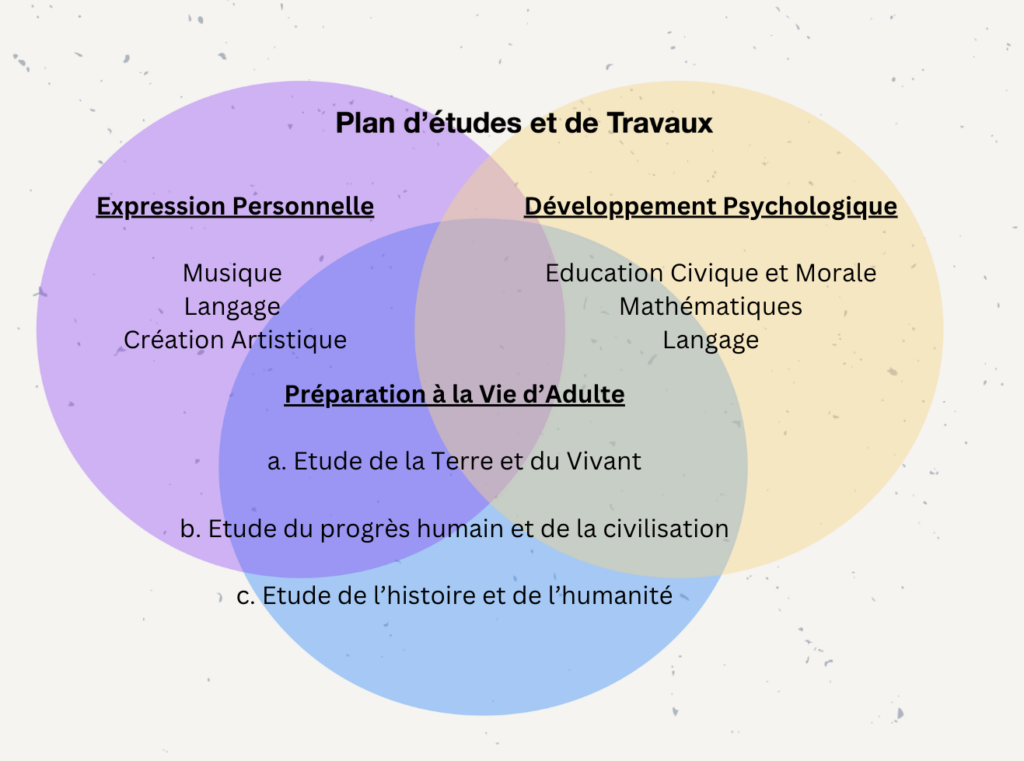Educational Project
The Montessori middle school fosters independence and social responsibility. Located in the heart of nature, it combines intellectual, manual, and emotional work to develop balanced and confident individuals capable of contributing positively to society. Montessori defines education as “an aid to life,” aiming to support each individual’s unique abilities for their development. The middle school offers adolescents concrete experiences to develop their autonomy and responsibility. Designed to strengthen self-confidence and social awareness, its environment encourages learning that integrates the mind, hand, and heart. Adults, guarantors of rigor, provide appropriate tools to meet the needs of adolescents in their community.
The teenager :
Every child is a source of hope for our humanity, endowed with immense potential. Our role is to create a safe and conducive space for their development. According to the Montessori perspective, the child is our primary guide. Our key values are kindness, respect, humility, and solidarity.
The student-adult relationship is a collaboration to cultivate interdisciplinary knowledge based on concrete experiences. Adolescents connect theory and practice to move beyond superficial understanding. Nurturing critical thinking, stimulating creativity, and encouraging discussion are essential. Community life teaches adolescents how to function in society. We respond to the needs of adolescents, regardless of social background, nationality, religion, sexual orientation, or disability.
The Location:
Our country house welcomes a group of teenagers of mixed ages, encouraging sharing and mutual support. In addition to their studies, they manage their daily needs.
The farm, run by teenagers, introduces students to science, agriculture, and the development of civilization. The cottage offers an experience in economics and hospitality, while the workshop allows them to practice crafts, with creations sold locally. Antique machines and tools enrich learning about culture, evolution, and engineering.
Les adultes, guides et parents, jouent un rôle clé en offrant outils et soutien adaptés. Cet environnement encourage l’indépendance, un apprentissage individualisé et un développement axé sur l’expression personnelle, le psychologique et la préparation à la vie adulte.
“Le travail à la terre, c’est à la fois une introduction à la nature et à la civilisation. Le travail à la terre c’est l’accès à la voie illimitée d’études scientifiques et historiques. Quant à la récolte qui s’ensuit, elle constitue une initiation au mécanisme social fondamental de la production et des échanges sur lequel repose la base économique de la société.”
Study and work plan :

Personal expression
Teens explore their creativity through music, dance, visual arts, writing, and literature. These activities allow them to express themselves, be heard, better understand themselves, and understand their emotions.
Psychological development
This area encompasses moral education, mathematics, and language, aiming to structure adolescents’ thinking. They learn to analyze the world, communicate effectively, and develop values to guide their social lives.
Preparation for adult life
Disciplines include the study of the earth and living things (biology, chemistry, zoology, etc.), human progress (physics, engineering, genetics, etc.), and history (governance, religion, literature, etc.). These explorations introduce adolescents to their culture and their role in society.
These three categories, although presented separately, are approached in an interdisciplinary manner to provide a holistic and in-depth understanding of the subjects. This approach, in line with the national curriculum, favors connected and holistic learning.
Skills assessment :
Students benefit from constant monitoring thanks to the small class size, as observation is central to Montessori teaching. Adults devote time to observing each child to understand their overall development. Regular one-on-one discussions allow for monitoring their challenges. Assessment is based on ongoing support and self-assessment practices discussed with adults. The national curriculum is integrated into the environment, and practice exams prepare for the National Brevet Diploma.
For us, successful education is not just about good grades, but also about the well-being and healthy development of adolescents. Adults educate students about national expectations while prioritizing personal growth and sustainable learning, without compromising their basic needs.
Complete educational project :
